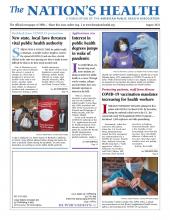
Fewer children in South Korea were infected with Kawasaki disease during 2020.
Photo courtesy Human Age, iStockphoto
Kawasaki disease drops in South Korea
Behaviors aimed at preventing the spread of COVID-19 may have also led to a substantial decline in Kawasaki disease in South Korea, a new study finds.
According to researchers, the findings suggest that Kawasaki disease — a condition that creates inflammation in blood vessels in the heart and is most common in children of Asian and Pacific Island descent — may be triggered by infectious agents.
The study, which was published in June in Circulation, is based on health records from a South Korean national health insurance database that span January 2010 to September 2020. Overall, researchers found nearly 53,500 cases of Kawasaki disease, with 83% of cases among children younger than 5.
However, the number of cases dropped by about 40% after COVID-19 prevention efforts such as masking and distancing were implemented in early 2020, with the greatest decrease among children younger than 9. No decrease was found among people ages 10 to 19. After Japan, South Korea has the second-highest incidence of Kawasaki disease in the world.
WHO: Better hygiene needed worldwide
The World Health Organization is calling on health care facilities to close the global gap in access to hand hygiene resources and infection prevention and control measures.
Globally, 1 in 4 health care facilities do not have basic water services, and 1 in 3 lack hand hygiene supplies at the point of care, WHO said in May. For example, according to an 88-country WHO survey published this year, progress on hand hygiene and infection prevention programs was much lower in low- and middle-income nations. In 2018, the survey found, just 45% of low-income countries had functional national infection prevention and control programs, compared to between 53% and 71% of middle- and high-income nations, respectively.
WHO’s infection prevention and control monitoring portal, which is now available, can help boost nations’ capacity to monitor their progress. For more information, visit https://ipcportal.who.int.
World Health adopts health decisions
At its 74th meeting in late May, the World Health Assembly adopted dozens of new resolutions and decisions addressing of range of public health issues, from diabetes, HIV and hepatitis to childhood violence, midwifery and oral health.
COVID-19 was also top of mind. On the last day of the meeting, member states agreed to gather again in November for a special session of the World Health Assembly to consider developing a WHO global agreement on preparedness and response to health emergencies. The assembly also agreed on a resolution reaffirming WHO’s role as the directing and coordinating authority in heath during emergencies.
“We need a generational commitment that outlives budgetary cycles, election cycles and media cycles, that creates an overarching framework for connecting the political, financial and technical mechanisms needed for strengthening global health security,” said WHO Director-General Tedros Adhanom Ghebreyesus, PhD.
For more on the meeting, visit www.who.int.
- Copyright The Nation’s Health, American Public Health Association









